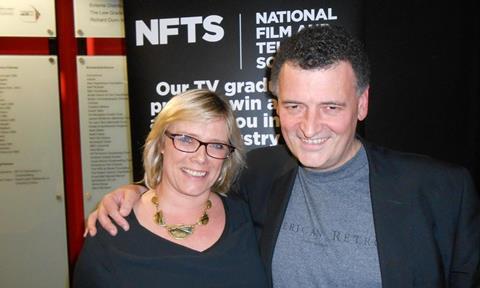The award-winning writer-producer duo advised on how to go from script to screen.

Steven Moffat and Sue Vertue, the award-winning writer and producer behind TV hits Doctor Who and Sherlock, gave National Film and Television School students a candid and highly entertaining Masterclass, in conversation with screenwriter Holly Phillips.
They discussed their early careers, backgrounds in comedy and what it takes to get a script onto screen.
“There is only one way to get something commissioned,” said Moffat. “Write a really good script. It’s not easy, but it’s the only way.”
Vertue shared this conviction, cautioning against taking a financial commitment too early: “Then you’re beholden, potentially before the script is ready – you should write what you want to write, not what you’ve promised to write.”
The creative freedom afforded by writing on spec is one of the aspects that the married duo credit with the success of their award-winning comedy Coupling, which was inspired in part by the early stages of their own relationship.
Both also credit their strong backgrounds in comedy. Moffat wrote Press Gang, Joking Apart, Murder Most Horrid, Chalk and the 1999 Doctor Who spoof The Curse of Fatal Death, and Vertue produced Mr Bean and The Vicar of Dibley, before they created Coupling together, and their later successes such as Sherlock.
Moffat said: “Nothing compares to getting an enormous laugh from an audience. It’s the best feedback you can get.”
“I would go through a script and tick every laugh to protect the joke,” added Vertue added
“Once you’ve been rehearsing something all week people start to think it isn’t funny – but I would look and see, I’d put three ticks by that line, so it must be good. Then I could also see the parts that really weren’t working.”
Moffat commented that good comedy rests on getting the audience to empathise with the character, and he learned to put heart into his writing through comedy.
“It’s not funny unless you care about the characters,” he explained, saying of Jeff, one of Coupling’s bumbling male leads, that: “as much as you want him to screw up so you can laugh, you also really, really want him to do better – and that’s what keeps you coming back for the next episode.”
He noticed comedy writers often make good writers on Doctor Who, because they are used to the discipline of the level of incident on a show where “there’s a cliff-hanger at the end of virtually every scene.”
“Every Doctor Who episode should be true to the voice of the individual writer,” he added. “I encourage the other writers to take it and treat it like they own it.”
Of getting the job of Showrunner on Doctor Who he said: “It was an amazing thing to happen. Very few people in this world get to do the specific job they wanted when they were eight.”
Moffat added he loves the show because of how close to home it lands: “Most sci-fi takes the audience to outer space – Doctor Who brings outer space and puts it under your bed – which makes it much more scary.”
On being asked by an audience member what common mistakes new writers make, Vertue said it was important to make sure a script always has a good opening, “and don’t try to emulate another writer’s style. You have to find your own voice.”
Moffat echoed this advice: “Make the first page really great – then the next – then the next.… Make it entertaining – make it impossible to put down, and it will get made.”






![The Brightest SunScreen[Courtesy HKIFF]](https://d1nslcd7m2225b.cloudfront.net/Pictures/274x183/3/5/0/1448350_thebrightestsunscreencourtesyhkiff_312678.jpg)


















No comments yet